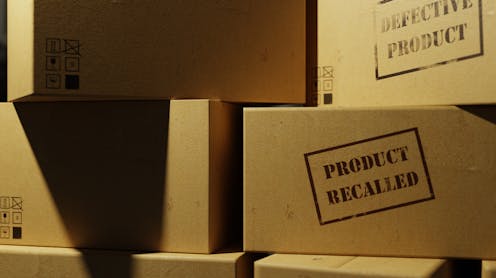Smart brands rein in ad spending when a rival faces a setback − here’s why
- Written by Vivek Astvansh, Associate Professor of Quantitative Marketing and Analytics, McGill University

Imagine: You’re in charge of marketing for a major automaker, and your biggest competitor just recalled thousands of vehicles. Now customers are worried about the safety of cars like yours. Do you seize the moment and ramp up advertising to steal market share? Or do you pull back on ads, fearing that customers will connect your brand with the bad press?
For what marketing professors like me[1] call “substitute brands,” this sort of dilemma pops up all the time. Whether it’s a product recall, a customer data breach or a scandal, bad news for one brand can shake customers’ confidence in an entire product category.
The big question: Should competitors respond by increasing or decreasing their advertising? And will these adjustments help or hurt sales?
At first glance, the answer might seem obvious. More ad spending should mean bigger market share, right? But the reality is more complex. In a recent study[2] looking at how 62 car brands responded to a 2014 recall, my colleagues and I found that, on average, when a rival brand issues a recall, its competitors cut their ad spending in half. In other words, most brands treat a rival’s crisis as a threat rather than an opportunity.
And when we looked at the ads’ content, we saw something even more interesting. When a rival brand stumbled, we found substitutes boosted their price-focused advertising by 25% on average, likely in an attempt to attract deal seekers. At the same time, they cut quality-focused advertising by 71%, possibly to avoid drawing unwanted comparisons.
And here’s the kicker: This strategy works.
We found, on average, a rival’s recall raises a substitute’s monthly sales by 35.3% – and the more a brand pulls back on ad spending, the greater the effect. So, when a competitor falters, the best response isn’t necessarily to shout louder. Instead, the data suggests a smarter play: Spend strategically, focus on price messaging, and avoid drawing attention to quality comparisons.
How we did our work
To understand how brands respond when a competitor faces a crisis, we focused on a real-world case: Volkswagen’s recall[3] of nearly half a million cars branded under the Sagitar model in October 2014. This provided the perfect opportunity to study how rival brands adjusted their advertising strategies.
We identified Sagitar’s substitute models – 62 other sedans in the A-class category, sold by more than 30 manufacturers – and collected data on sales and ad spending across 308 media markets in the months before and after the recall. We then did a statistical analysis, controlling for several other variables that could influence ad spending.
Why it matters
Prior research offers mixed guidance[5] on how a substitute brand should adjust its ad spending after a rival’s marketing crisis. Anecdotal evidence[6] from the automotive and consumer goods industries is also mixed. For example, after Samsung recalled its Galaxy Note 7 in 2016 due to faulty batteries, competing phonemakers aggressively ramped up their advertising[7] in an attempt to increase their market share[8].
Similarly, in 2010, after a Toyota recall, General Motors offered incentives for Toyota owners to switch to a GM car[9]. GM’s chief marketing officer positioned these incentives[10] as GM’s way to meet car buyers’ desire for peace of mind, and reports suggest that GM’s and other rival carmakers’ sales increased[11] following Toyota’s recall.
But my team’s research suggests that this sort of strategy might not be the best one. Sometimes, saying less actually says more.
The Research Brief[12] is a short take on interesting academic work.
References
- ^ marketing professors like me (luddy.indiana.edu)
- ^ recent study (doi.org)
- ^ Volkswagen’s recall (sg.news.yahoo.com)
- ^ Volkswagen AG (www.volkswagen-newsroom.com)
- ^ mixed guidance (doi.org)
- ^ Anecdotal evidence (doi.org)
- ^ aggressively ramped up their advertising (www.reuters.com)
- ^ increase their market share (www.reuters.com)
- ^ incentives for Toyota owners to switch to a GM car (jalopnik.com)
- ^ positioned these incentives (jalopnik.com)
- ^ GM’s and other rival carmakers’ sales increased (www.npr.org)
- ^ Research Brief (theconversation.com)







